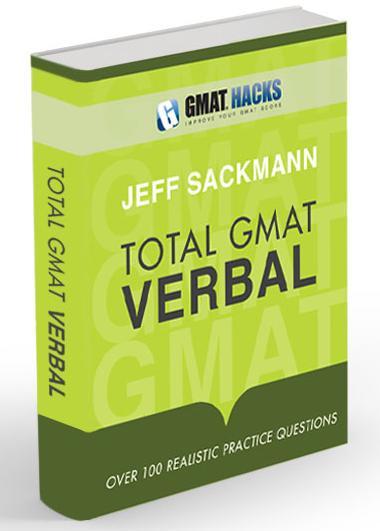
Bookshelf
|
|
Total GMAT Math Jeff's complete Quant guide, on sale now! |
|
|
Total GMAT Verbal Everything you need to ace GMAT Verbal! |
1,800 Practice Math Questions
Buy Jeff's books at Amazon.com

GMAT Official Guide, with IR
OG Math | OG Verbal
OG12 & Quant Rev solutions!
GMAT Question of the Day
Beginner's Guide to the GMAT
GMAT Hacks Affiliate Program

Recent Hacks

Categories
- General Study Tips
- Goals and Planning
- CAT Strategy
- The Mental Game
- GMAT Math Strategy
- GMAT Math Topics
- Mental Math
- Data Sufficiency
- Critical Reasoning
- Reading Comprehension
- Sentence Correction
- Analytical Writing Assessment
- Integrated Reasoning
- IR Explained
- Business School Admissions
- GMAT Prep Resources
- Practice Questions
- Total GMAT Math
- Total GMAT Verbal
- GMAT 111

Seven Common GMAT Mistakes
| You should follow me on Twitter. While you're at it, take a moment to subscribe to GMAT Hacks via RSS or Email. |
There are many ways to keep your GMAT score low. I hope you don't do any of them, but very few students can honestly claim to be free of all seven dangers I list below.
1. Answering Every Question
Unless you're really, really good at the GMAT (GMAT Math in particular), you won't have time to fully address every single question. The more time you spend on the questions you can't quite answer, the less time you'll have for easier questions later on in the test.
Solution: Plan to guess on a handful of questions per section.
2. Focusing Too Much on the First 5-10 Questions
Everybody has heard about the apparent importance of the first 5-10 questions. In the end, though, that's a myth. Of course, it would be nice to get them all right, but the more time you spend on the first questions in each section, the more your score will suffer as you rush through the last 30.
Solution: Treat every question equally.
3. Not Enough Scratchwork
Under the pressure of test day and the clock ticking down, many test-takers are tempted to spend less time writing down notes and figuring out problems on paper. You have plenty of scratch paper, and you can always ask for more. In my experience, students who write down more are able to work through problems that much faster.
Solution: Practice consistent scratchwork, and follow that pattern when you take the GMAT.
4. Interpreting Question Difficulty
We all know that the GMAT is an adaptive test, so if you start seeing questions that look easy, it's tempting to conclude that you must not be doing well. Sometimes that's the case, and sometimes it's not. That conclusion has serious side-effects: Regardless of how true it is, it's the worst possible thing to tell yourself when you are trying to stay positive and answer every question you can.
Solution: Ignore the difficulty level of each question. Treat easy ones as a gift and a way to save time.
5. Calculating on Data Sufficiency
On Data Sufficiency questions, there's no place to enter a numerical answer. Still, too many students don't feel confident in saying that a statement is sufficient until they've solved for x. It's a waste of time.
Solution: Train yourself to recognize sufficient choices well before you find the precise value of x.
6. Making Assumptions in Critical Reasoning
Many CR questions are like logic puzzles. You are asked to make an inference or find a claim that strengthens the argument, and the passage uses very precise language. Many students, instead of carefully analyzing each of the several sentences in the passage, skim the passage and make their own assumptions. It's a subtle trap, but a dangerous one.
Solution: Don't assume anything that isn't in the passage.
7. Avoiding Sentence Correction Choice (A)
On GMAT SC questions, choice (A) is always the same as the original sentence. It's what you choose if you think the sentence is already correct. Perhaps because the question type is called "Sentence Correction," many students avoid choosing (A) at all costs. In fact, (A) is just as common as the other choices.
Solution: Don't be afraid to choose (A)!
As you might have noticed, there are a lot of links in this article. As these are common errors, I've written about many of them before. If you think you might make some of these mistakes, I encourage you to go read more about them so that you won't fall prey when you take the GMAT!
About the author: Jeff Sackmann has written many GMAT preparation books, including the popular Total GMAT Math, Total GMAT Verbal, and GMAT 111. He has also created explanations for problems in The Official Guide, as well as 1,800 practice GMAT math questions.
 |
Total GMAT Verbal
The comprehensive guide to the GMAT Verbal section. Recognize, dissect, and master every question type
you'll face on the test. Everything you need, all in one place, including 100+ realistic practice questions. |